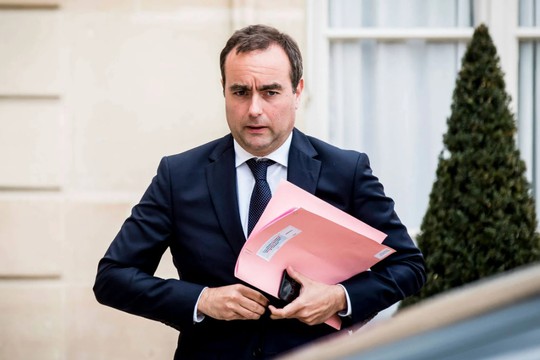Sebastien Lecornu
Photo: Bloomberg
French President Emmanuel Macron named loyalist Sebastien Lecornu, a one-time conservative protege who rallied behind his 2017 presidential run, as prime minister on Tuesday, defying expectations he might tack towards the left, Reuters notes.
The choice of Lecornu, 39, indicates Macron's determination to press on with a minority government that will not rip up his pro-business reform agenda, under which taxes on business and the wealthy have been cut and the retirement age raised.
However, in an unusual move in French politics, Macron's office said the president had asked Lecornu to hold talks with all political forces in parliament to find compromises on the budget and other policies before naming his cabinet.
"The President of the Republic has entrusted me with the task of building a government with a clear direction: the defense of our independence and our power, the service of the French people, and political and institutional stability," Lecornu posted. "I wish to thank him for the confidence he has shown me by appointing me Prime Minister."
Lecornu will become Macron's fifth prime minister in less than two years after parliament, deeply split between three opposing ideological camps, ousted Francois Bayrou on Monday over his plans to tame the country's ballooning debt.
The choice by the deeply unpopular Macron to appoint a loyalist risks appearing tone-deaf and inflaming popular discontent at a time when polls suggest voters are losing faith with France's dysfunctional politics.
The news of his appointment was greeted with derision by leftist parties who called for voters to express their disdain in nationwide "Block Everything" protests on Wednesday.
The hard-left France Unbowed party said it would file a motion of no confidence against Lecornu, but it appears unlikely to succeed after the far-right National Rally (RN) party President Jordan Bardella signalled tentative willingness to work with Lecornu on the budget - for now.
That would leave Lecornu and his government reliant on the whims of the RN, which has been instrumental in bringing down both Bayrou and his predecessor Michel Barnier.
Lecornu's immediate priority will be to forge consensus on a budget for 2026, a task that proved the undoing of Bayrou who had pushed for aggressive spending cuts to rein in a deficit standing at nearly double the EU ceiling of 3% of GDP.
The political upheaval this week lays bare deepening turmoil in France that is weakening the euro zone's second-biggest economy as it sinks deeper into a debt quagmire.
Lecornu most recently served as Macron's defence minister, overseeing an increase in defence spending and helping shape European thinking on security guarantees for Ukraine in the event a peace deal with Russia is brokered.
Lecornu entered politics canvassing for former President Nicolas Sarkozy when he was 16. He became mayor of a small town in Normandy when he turned 18 and then former President Nicolas Sarkozy's youngest government adviser at the age of 22.
He left the conservative Les Republicains party to join Macron's centrist political movement when the president was first elected in 2017. Five years later, he ran Macron's re-election campaign.
By naming a minister from his own camp with a conservative background, Macron appears to have decided to preserve his economic legacy at all cost.
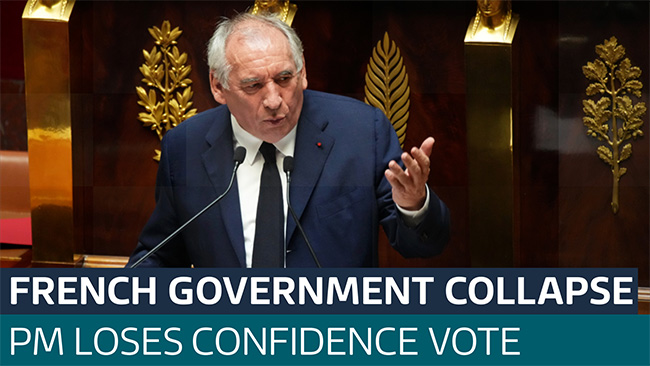 François Bayrou
François Bayrou
French lawmakers toppled Prime Minister François Bayrou’s minority government on Monday evening, thrusting the country deeper into a political crisis that will force President Emmanuel Macron to name a fifth premier in less than two years, POLITICO reports.
Three hundred and sixty four lawmakers voted to oust Bayrou, while 194 supported him.
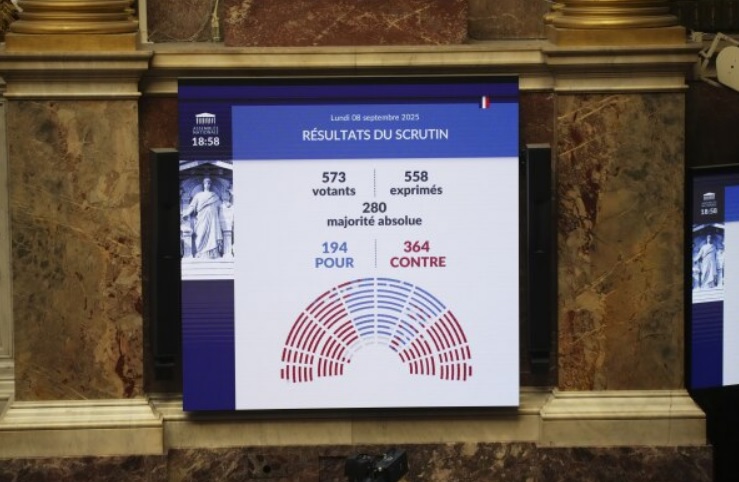 Photo: AP
Photo: AP
President Emmanuel Macron’s escape route out of the political and economic crisis gripping France now looks almost impossibly narrow. There are grave doubts that the new appointee – Sebastien Lecornu – will prove any more successful than Bayrou in forcing through the tens of billions of euros of budget cuts needed to save the EU’s second-biggest economy from a ballooning debt crisis.
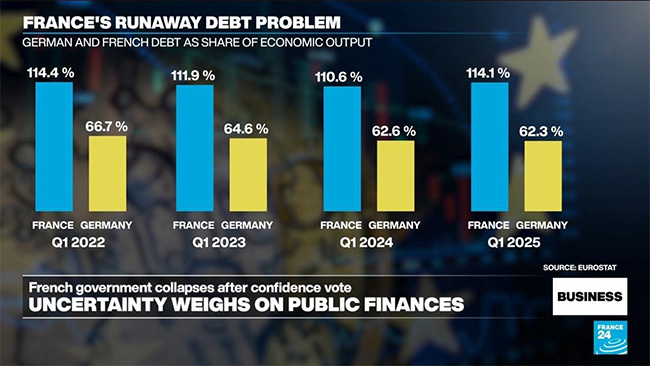
Macron is now squarely in the line of public fire, ahead of threats of a national shutdown on Sept. 10 and major protests planned by trade unions on Sept. 18. The president’s popularity has dropped to an all-time low, with polls showing he is more unpopular today than at the peak of the Yellow Vest protests in 2018 and 2019, one of the gravest crises of his tenure.
Ever confident in his ability to wriggle, Houdini-like, out of the worst of tangles, Macron is still holding out for a deal with the moderate left, the centrists and the conservative Les Républicains party to form a minority government that can finally reach an agreement over the budget.
But Macron is almost certainly clutching at straws in a country that looks increasingly ungovernable. The scale of Bayrou’s defeat in parliament on Monday and the signals emerging from lawmakers already suggest his efforts are doomed from the outset.
Macron tries to hold the center
During a day of high drama in parliament, opposition parties rounded on Macron as the protagonist responsible for the stalemate engulfing France.
“There is only one person responsible for the crisis, for the fiasco and instability, it’s the president of the Republic,” said Boris Vallaud, the Socialist Party’s parliamentary leader.
Communist parliamentary leader Stéphane Peu likened the crisis to “Saving Private Ryan” with Bayrou being “the fourth prime minister to fall to save President Macron.”
After the vote, many called for Macron to step down. “The president doesn’t want to change his policies? Well, we’ll have to change president,” said Mathilde Panot, parliamentary head of the far-left France Unbowed party.
Macron faces an intense challenge in keeping the center together, while the far-right National Rally — the party that tops the polls — and the far left are on an anti-establishment blitz, threatening to bring down any future administrations that slash public spending.
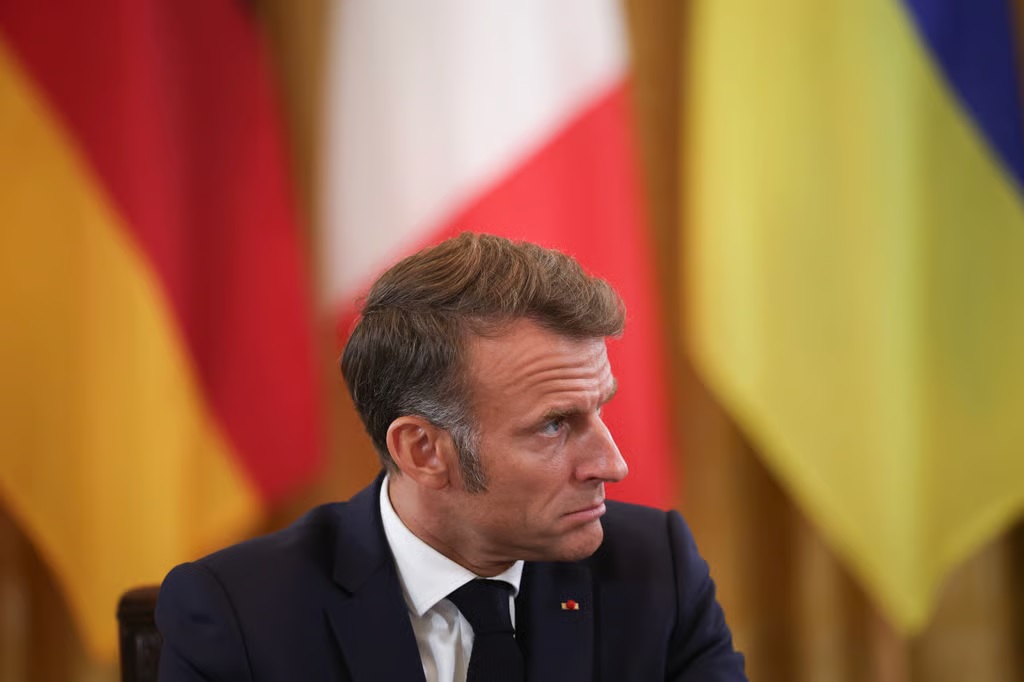 Emmanuel Macron is now squarely in the line of public fire. Government downfall tests Macron like never before.
Emmanuel Macron is now squarely in the line of public fire. Government downfall tests Macron like never before.
Photo: Getty Images
In his valedictory speech before the National Assembly, Bayrou warned against complacency about the depths of France’s financial mess, saying the nation suffers from a “life-threatening” level of debt.
“You have the power to overthrow the government” but not “to erase reality,” he told lawmakers.
But very quickly, opposition leaders were already looking to the post-Bayrou scenarios.
Sensing an opportunity for the left, the Socialist Vallaud called on the liberal President Macron to “do his duty” and appoint a prime minister from their ranks. “We are ready, come and get us,” he said.
He touted “another path” for France that would include what he described as a fairer tax policy and said the Socialists would row back on Bayrou’s proposed cancellation of two bank holidays.
Far-right leader Marine Le Pen also cast doubt on Macron’s ability to hold the center, and to get any left-right alliance to agree on a budget. The only option, as she saw it, was to call an election.
“Dissolving parliament will not be option, but an obligation,” she said.
But that election would also probably do little to heal the divisions at the heart of the crippling national impasse.
The president is pinning his hopes on what looks like a very unlikely centrist alliance to slash public spending, when all others have failed.
In an extreme scenario, Macron could even resign, but that’s highly unlikely given his past statements, POLITICO notes.
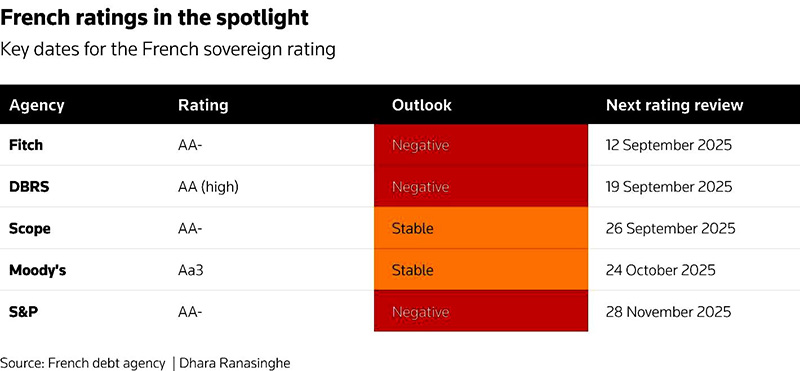
France faces a slew of key sovereign debt rating reviews from next week, with the risk of a downgrade rising as the government, Reuters notes.
While France's rating was downgraded by Moody's after its previous government collapsed last year, a repeat would be a heavier blow, pushing it to a lower rating category and raising the risk of forced selling of its already pressured bonds.
Citi senior European rates strategist Aman Bansal is among analysts who think the confidence vote increases the risk of a downgrade.
A Fitch downgrade would push France's rating to A+, seven notches above junk territory and the lowest among peers.
Fitch Ratings has affirmed Agence Francaise de Developpement's (AFD) Long-Term Issuer Default Rating (IDR) at 'AA-' with a Negative Outlook, and Short-Term IDR at 'F1+'.
A downgrade of France's ratings would lead to a downgrade of AFD's ratings.
Fitch considers AFD a government-related entity (GRE) of the French state (AA-/Negative) and equalises its ratings with those of the sovereign. The Negative Outlook mirrors that on the sovereign.
In Fitch's view, a default by AFD would have a material impact on an important policy mission of the state and could have grave political repercussions.
AFD has an important role in France's foreign policy. It is the main operator of bilateral development aid, liaising with several domestic and international partners, including international financial institutions, sovereigns, and local authorities. The French government relies on AFD to increase its official development assistance and to carry out international commitments such as sustainable development goals outlined in the UN's 2030 Agenda for Sustainable Development and the Paris Agreement. AFD's operations are primarily funded by debt markets, so a default would have a direct impact on its ability to fulfil its mission.
Fitch views AFD as a core government entity for the state due to its important policy role. AFD is a reference issuer in France and has access to domestic and international financial markets. Fitch believes a default by AFD would have a direct impact on other French GREs, especially etablissements publics, as it would erode investor confidence in the willingness of the state to support its entities.
AFD is the French state's development finance agency. It is responsible for providing concessional loans and budgetary aid to public-sector counterparties in developing markets, including French overseas territories, and to private-sector entities through its main subsidiary, Proparco. It also provides technical assistance through Expertise France.
Bankers in Paris this week said the political turmoil had injected fresh uncertainty into dealmaking, unnerving corporate executives and denting France's appeal as an investment destination.
…The loss of Fitch's credit rating is a threat to the prospects of the French economy.
Together with the collapse of the government, the Republic faces critical financial and economic problems with political overtones of early elections and a sharp weakening of President Macron's power.
read more in our Telegram-channel https://t.me/The_International_Affairs

 13:28 10.09.2025 •
13:28 10.09.2025 •
